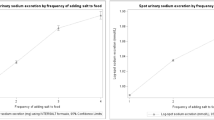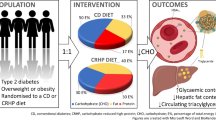Abstract
Background/objectives
There are few reports on the relationship between skipping breakfast and chronic kidney disease (CKD). We examined the skipping breakfast-CKD relationship and the mediation effects of metabolic diseases (obesity, hypertension, and diabetes) on this relationship.
Subjects/methods
We analyzed the data of 21,138 participants aged ≥ 40 years from the Korea National Health and Nutrition Examination Survey 2013–2018. Skipping breakfast was defined as rarely eating breakfast over the past year. CKD was defined as decreased kidney function expressed by an estimated glomerular filtration rate of < 60 mL/min/1.73 m2. We used a complex sample logistic regression model to examine the relationship between skipping breakfast and CKD. We used Baron and Kenny’s approach to examine whether metabolic diseases work as a mediator within the skipping breakfast-CKD relationships.
Results
About 7.6% of participants skipped breakfast, and 5.5% had CKD. After adjusting for confounders, participants who skipped breakfast were at higher odds of having CKD (odds ratio 1.61; 95% confidence interval 1.07–2.42; p value 0.021) compared to those who did not skip breakfast. With full adjustments for confounders, skipping breakfast was not significantly associated with any metabolic diseases, while CKD was significantly associated with diabetes and hypertension.
Conclusion
We found that middle-aged or older people who skipped breakfast had a significantly higher odds of having CKD compared to those who did not skip breakfast. However, metabolic diseases did not mediate the relationship between skipping breakfast and CKD.

Similar content being viewed by others
Data availability
The KNHANES data is publicly available (https://knhanes.kdca.go.kr/knhanes/sub03/sub03_02_05.do). No permission is required to access the data.
References
Webster AC, Nagler EV, Morton RL, Masson P (2017) Chronic kidney disease. Lancet 389(10075):1238–1252. https://doi.org/10.1016/S0140-6736(16)32064-5
Jha V, Garcia-Garcia G, Iseki K, Li Z, Naicker S, Plattner B, Saran R, Wang AY, Yang CW (2013) Chronic kidney disease: global dimension and perspectives. Lancet 382(9888):260–272. https://doi.org/10.1016/S0140-6736(13)60687-X
Kim SH, Jo MW, Go DS, Ryu DR, Park J (2017) Economic burden of chronic kidney disease in Korea using national sample cohort. J Nephrol 30(6):787–793. https://doi.org/10.1007/s40620-017-0380-3
Wang V, Vilme H, Maciejewski ML, Boulware LE (2016) The economic burden of chronic kidney disease and end-stage renal disease. Semin Nephrol 36(4):319–330. https://doi.org/10.1016/j.semnephrol.2016.05.008
Ji E, Kim YS (2016) Prevalence of chronic kidney disease defined by using CKD-EPI equation and albumin-to-creatinine ratio in the Korean adult population. Korean J Intern Med 31(6):1120–1130. https://doi.org/10.3904/kjim.2015.193
Kim S, Lim CS, Han DC, Kim GS, Chin HJ, Kim SJ, Cho WY, Kim YH, Kim YS (2009) The prevalence of chronic kidney disease (CKD) and the associated factors to CKD in urban Korea: a population-based cross-sectional epidemiologic study. J Korean Med Sci 24(Suppl):S11-21. https://doi.org/10.3346/jkms.2009.24.S1.S11
Park JI, Baek H, Jung HH (2016) Prevalence of chronic kidney disease in Korea: the Korean National Health and Nutritional Examination Survey 2011–2013. J Korean Med Sci 31(6):915–923. https://doi.org/10.3346/jkms.2016.31.6.915
Shin SY, Kwon MJ, Park H, Woo HY (2014) Comparison of chronic kidney disease prevalence examined by the chronic kidney disease epidemiology collaboration equation with that by the modification of diet in renal disease equation in Korean adult population. J Clin Lab Anal 28(4):320–327. https://doi.org/10.1002/jcla.21688
Collaboration GBDCKD (2020) Global, regional, and national burden of chronic kidney disease, 1990–2017: a systematic analysis for the Global Burden of Disease Study 2017. Lancet 395(10225):709–733. https://doi.org/10.1016/S0140-6736(20)30045-3
O’Neil CE, Nicklas TA, Fulgoni VL 3rd (2014) Nutrient intake, diet quality, and weight/adiposity parameters in breakfast patterns compared with no breakfast in adults: National Health and Nutrition Examination Survey 2001–2008. J Acad Nutr Diet 114(12 Suppl):S27-43. https://doi.org/10.1016/j.jand.2014.08.021
Drewnowski A, Rehm CD, Vieux F (2018) Breakfast in the United States: Food and Nutrient Intakes in Relation to Diet Quality in National Health and Examination Survey 2011–2014. A Study from the International Breakfast Research Initiative. Nutrients 10(9):1200. https://doi.org/10.3390/nu10091200
Lee SA, Park EC, Ju YJ, Lee TH, Han E, Kim TH (2017) Breakfast consumption and depressive mood: a focus on socioeconomic status. Appetite 114:313–319. https://doi.org/10.1016/j.appet.2017.04.007
Kant AK, Graubard BI (2015) 40-year trends in meal and snack eating behaviors of American adults. J Acad Nutr Diet 115(1):50–63. https://doi.org/10.1016/j.jand.2014.06.354
Deshmukh-Taskar P, Nicklas TA, Radcliffe JD, O’Neil CE, Liu Y (2013) The relationship of breakfast skipping and type of breakfast consumed with overweight/obesity, abdominal obesity, other cardiometabolic risk factors and the metabolic syndrome in young adults. The National Health and Nutrition Examination Survey (NHANES): 1999-2006. Public Health Nutr 16(11):2073–2082. https://doi.org/10.1017/S1368980012004296
Lee TS, Kim JS, Hwang YJ, Park YC (2016) Habit of eating breakfast is associated with a lower risk of hypertension. J Lifestyle Med 6(2):64–67. https://doi.org/10.15280/jlm.2016.6.2.64
Ballon A, Neuenschwander M, Schlesinger S (2019) Breakfast skipping is associated with increased risk of type 2 diabetes among adults: a systematic review and meta-analysis of prospective cohort studies. J Nutr 149(1):106–113. https://doi.org/10.1093/jn/nxy194
Farshchi HR, Taylor MA, Macdonald IA (2005) Deleterious effects of omitting breakfast on insulin sensitivity and fasting lipid profiles in healthy lean women. Am J Clin Nutr 81(2):388–396. https://doi.org/10.1093/ajcn.81.2.388
Cahill LE, Chiuve SE, Mekary RA, Jensen MK, Flint AJ, Hu FB, Rimm EB (2013) Prospective study of breakfast eating and incident coronary heart disease in a cohort of male US health professionals. Circulation 128(4):337–343. https://doi.org/10.1161/CIRCULATIONAHA.113.001474
Uzhova I, Fuster V, Fernandez-Ortiz A, Ordovas JM, Sanz J, Fernandez-Friera L, Lopez-Melgar B, Mendiguren JM, Ibanez B, Bueno H, Penalvo JL (2017) The importance of breakfast in atherosclerosis disease: insights from the PESA study. J Am Coll Cardiol 70(15):1833–1842. https://doi.org/10.1016/j.jacc.2017.08.027
Kutsuma A, Nakajima K, Suwa K (2014) Potential association between breakfast skipping and concomitant late-night-dinner eating with metabolic syndrome and proteinuria in the Japanese population. Scientifica (Cairo) 2014:253581. https://doi.org/10.1155/2014/253581
Nazar CM (2013) Significance of diet in chronic kidney disease. J Nephropharmacol 2(2):37–43
Levey AS, Stevens LA, Schmid CH, Zhang YL, Castro AF 3rd, Feldman HI, Kusek JW, Eggers P, Van Lente F, Greene T, Coresh J, Ckd EPI (2009) A new equation to estimate glomerular filtration rate. Ann Intern Med 150(9):604–612. https://doi.org/10.7326/0003-4819-150-9-200905050-00006
Physical activity guidelines for Americans (2008). Okla Nurse 53(4):25
Shiroma EJ, Sesso HD, Moorthy MV, Buring JE, Lee IM (2014) Do moderate-intensity and vigorous-intensity physical activities reduce mortality rates to the same extent? J Am Heart Assoc 3(5):e000802. https://doi.org/10.1161/JAHA.114.000802
Baron RM, Kenny DA (1986) The moderator-mediator variable distinction in social psychological research: conceptual, strategic, and statistical considerations. J Pers Soc Psychol 51(6):1173–1182. https://doi.org/10.1037//0022-3514.51.6.1173
Michishita R, Matsuda T, Kawakami S, Kiyonaga A, Tanaka H, Morito N, Higaki Y (2016) The association between unhealthy lifestyle behaviors and the prevalence of chronic kidney disease (CKD) in middle-aged and older men. J Epidemiol 26(7):378–385. https://doi.org/10.2188/jea.JE20150202
Kim YJ, Yoon JH, Choi HS, Kim CS, Bae EH, Ma SK, Kim SW (2020) Meal frequency and skipping breakfast are associated with chronic kidney disease. Nutrients 12(2):331. https://doi.org/10.3390/nu12020331
Kambham N, Markowitz GS, Valeri AM, Lin J, D’Agati VD (2001) Obesity-related glomerulopathy: an emerging epidemic. Kidney Int 59(4):1498–1509. https://doi.org/10.1046/j.1523-1755.2001.0590041498.x
Witbracht M, Keim NL, Forester S, Widaman A, Laugero K (2015) Female breakfast skippers display a disrupted cortisol rhythm and elevated blood pressure. Physiol Behav 140:215–221. https://doi.org/10.1016/j.physbeh.2014.12.044
Bidani AK, Griffin KA (2004) Pathophysiology of hypertensive renal damage: implications for therapy. Hypertension 44(5):595–601. https://doi.org/10.1161/01.HYP.0000145180.38707.84
Uemura M, Yatsuya H, Hilawe EH, Li Y, Wang C, Chiang C, Otsuka R, Toyoshima H, Tamakoshi K, Aoyama A (2015) Breakfast skipping is positively associated with incidence of type 2 diabetes mellitus: evidence from the Aichi Workers’ Cohort Study. J Epidemiol 25(5):351–358. https://doi.org/10.2188/jea.JE20140109
Toth-Manikowski S, Atta MG (2015) Diabetic kidney disease: pathophysiology and therapeutic targets. J Diabetes Res 2015:697010. https://doi.org/10.1155/2015/697010
Falk E (2006) Pathogenesis of atherosclerosis. J Am Coll Cardiol 47(8 Suppl):C7-12. https://doi.org/10.1016/j.jacc.2005.09.068
Chade AR, Lerman A, Lerman LO (2005) Kidney in early atherosclerosis. Hypertension 45(6):1042–1049. https://doi.org/10.1161/01.HYP.0000167121.14254.a0
Samuel VT, Shulman GI (2016) The pathogenesis of insulin resistance: integrating signaling pathways and substrate flux. J Clin Invest 126(1):12–22. https://doi.org/10.1172/JCI77812
Sarafidis PA, Ruilope LM (2006) Insulin resistance, hyperinsulinemia, and renal injury: mechanisms and implications. Am J Nephrol 26(3):232–244. https://doi.org/10.1159/000093632
Tomi R, Yamamoto R, Shinzawa M, Kimura Y, Fujii Y, Aoki K, Ozaki S, Yoshimura R, Taneike M, Nakanishi K, Nishida M, Yamauchi-Takihara K, Kudo T, Isaka Y, Moriyama T (2020) Frequency of breakfast, lunch, and dinner and incidence of proteinuria: a Retrospective Cohort Study. Nutrients 12(11):3549. https://doi.org/10.3390/nu12113549
Ogata H, Hatamoto Y, Goto Y, Tajiri E, Yoshimura E, Kiyono K, Uehara Y, Kawanaka K, Omi N, Tanaka H (2019) Association between breakfast skipping and postprandial hyperglycaemia after lunch in healthy young individuals. Br J Nutr 122(4):431–440. https://doi.org/10.1017/S0007114519001235
Jakubowicz D, Wainstein J, Ahren B, Landau Z, Bar-Dayan Y, Froy O (2015) Fasting until noon triggers increased postprandial hyperglycemia and impaired insulin response after lunch and dinner in individuals with type 2 diabetes: a randomized clinical trial. Diabetes Care 38(10):1820–1826. https://doi.org/10.2337/dc15-0761
Mah E, Bruno RS (2012) Postprandial hyperglycemia on vascular endothelial function: mechanisms and consequences. Nutr Res 32(10):727–740. https://doi.org/10.1016/j.nutres.2012.08.002
Duni A, Liakopoulos V, Roumeliotis S, Peschos D, Dounousi E (2019) Oxidative stress in the pathogenesis and evolution of chronic kidney disease: untangling Ariadne’s thread. Int J Mol Sci 20(15):3711. https://doi.org/10.3390/ijms20153711
Toblli JE, Bevione P, Di Gennaro F, Madalena L, Cao G, Angerosa M (2012) Understanding the mechanisms of proteinuria: therapeutic implications. Int J Nephrol 2012:546039. https://doi.org/10.1155/2012/546039
Funding
No funding was received for this study.
Author information
Authors and Affiliations
Contributions
CG and SP participated in the planning and design of the study. CG analyzed data and participated in writing the primary manuscript. SP had primary responsibility for the final content. All authors read and approved the final manuscript.
Corresponding author
Ethics declarations
Conflict of interest
The authors declare no conflict of interest.
Additional information
Publisher's Note
Springer Nature remains neutral with regard to jurisdictional claims in published maps and institutional affiliations.
Rights and permissions
Springer Nature or its licensor (e.g. a society or other partner) holds exclusive rights to this article under a publishing agreement with the author(s) or other rightsholder(s); author self-archiving of the accepted manuscript version of this article is solely governed by the terms of such publishing agreement and applicable law.
About this article
Cite this article
Gahm, C., Park, S. The association between skipping breakfast and chronic kidney disease. Int Urol Nephrol 55, 3209–3215 (2023). https://doi.org/10.1007/s11255-023-03590-5
Received:
Accepted:
Published:
Issue Date:
DOI: https://doi.org/10.1007/s11255-023-03590-5




